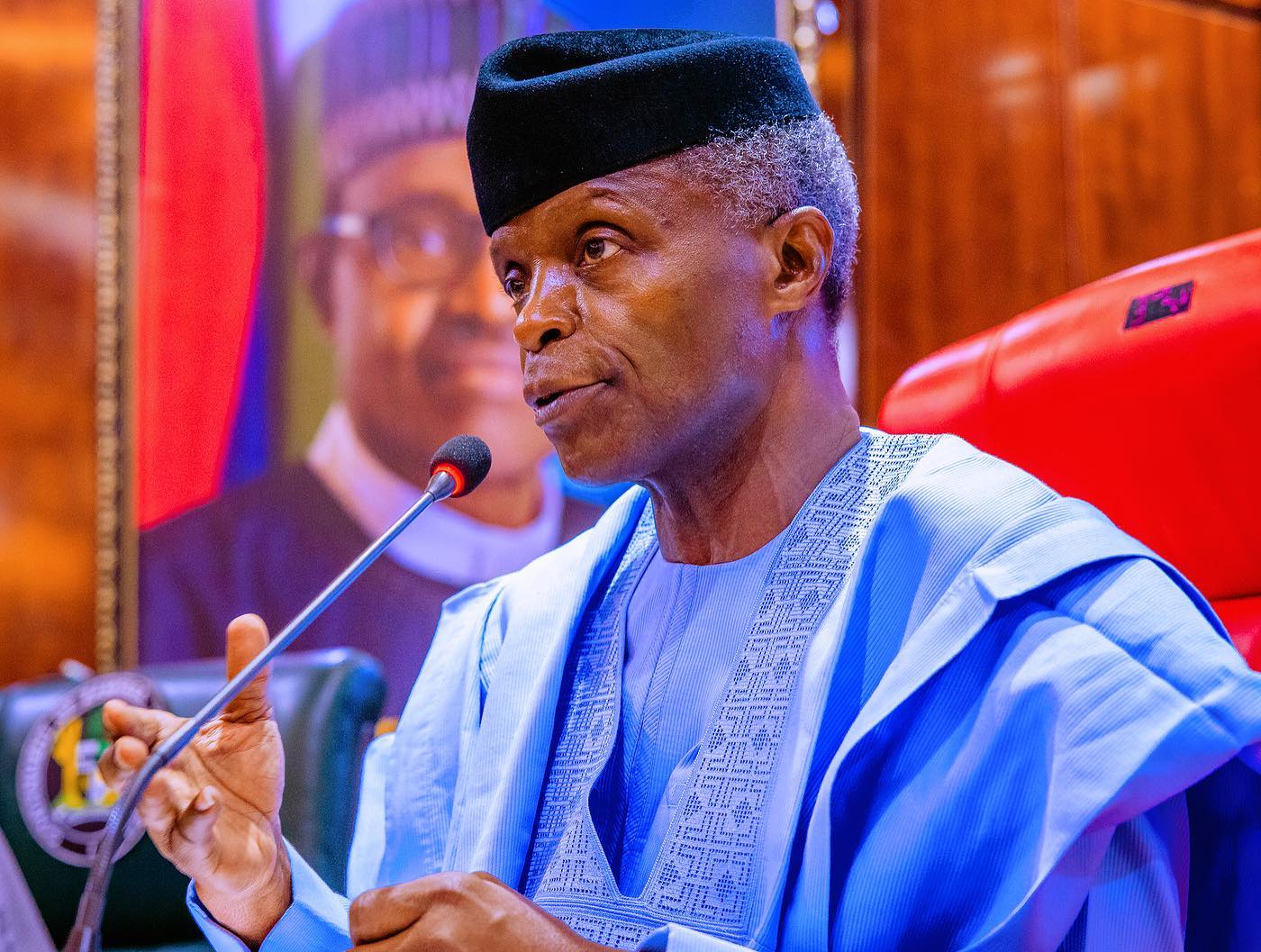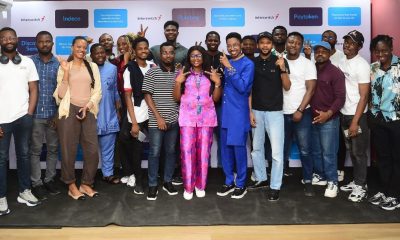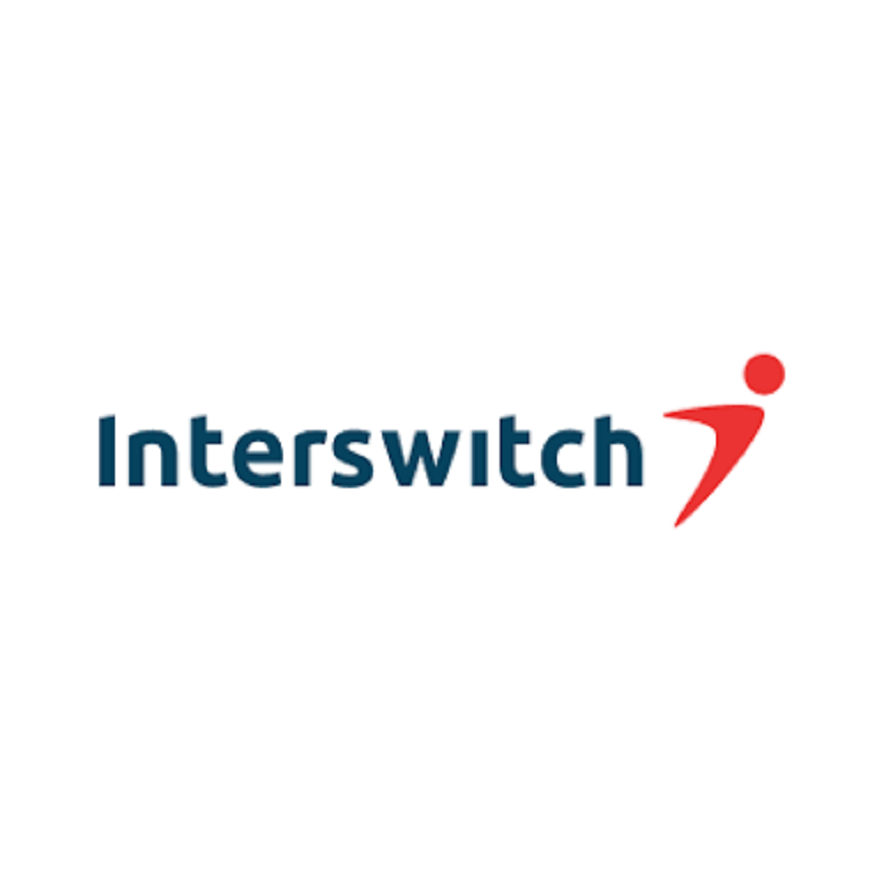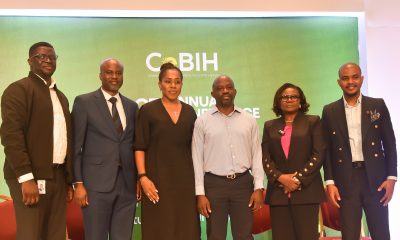Technology
Osinbajo Advocates Closing Entrepreneurial Gap with Technology, Innovation

By Adedapo Adesanya
Nigeria’s Vice President, Mr Yemi Osinbajo, has reiterated the need to close the entrepreneurial gap with the rapid growth of innovation and technology recorded over the years globally.
This was the view of the Vice President in a pre-recorded speech at a weekend ceremony in Lagos to mark the 20th anniversary of Interswitch, a leading fintech company in Nigeria and Africa.
He said there are even more exciting new frontiers to be explored and harnessed by Nigeria’s talented and enterprising young entrepreneurs.
Speaking at the ceremony Saturday evening, Mr Osinbajo noted that “as innovation and technology open exciting new frontiers in medicine and healthcare, we can rest assured that Nigeria will not lag behind.”
Noting that “innovative disruptions thrive on natural and human occasioned gaps within the system,” the VP added that many of such are in Africa.
According to the Vice President, “this is why our continent is undoubtedly the next and possibly the last frontier.”
“All across the continent, there are yawning gaps waiting to be plugged by innovative ideas and entrepreneurial efforts. It is exciting to see how sprightly young people, particularly, are rising to the challenge and the accelerated pace of creative disruptions in their wake,” he added.
Speaking further on the incredible talents and potential of Nigeria and Africa’s young people to drive socio-economic growth, the VP stated that, “in 2021 alone, African tech startups raised over $ 4 billion in funding, with over 564 startups across the continent solving critical problems in almost every sector.
“Within the next two decades, Africa’s workforce will be the largest in the world. They are skilled, and they are coming. As a result, more innovative disruptors will yet emerge to plug more of these gaps.”
Mr Osinbajo further said the President Buhari administration would continue to provide the enabling environment for young entrepreneurs and businesses to thrive.
“Our responsibility as a government has been to meet them halfway and perhaps outpace them with corresponding creativity in the provision of forward-thinking regulatory frameworks and adequate infrastructure. I can assure you that no effort is being spared in this regard.
“Nevertheless, there is still so much to be done; and a lot of ground to cover. I have no doubt, though, that we are up to the task,” he emphasised.
The VP observed that “it is through innovative disruptions that humans have managed to resolve their most complex challenges and stay ahead of the survival curve.
“Oftentimes, these ideas are championed by mavericks who find better, safer, and more cost-effective ways for us to live, do business, and govern; slight tweaks that improve our overall experience, and complete overhauls that lead us into new paths altogether.”
On what he described as ‘two rigorous decades of accelerated change,’ since Interswitch was founded 20 years ago, he noted that it was “incredible that what began as a novel idea to facilitate seamless payments across Africa has in barely two decades become something of an icon of technology and innovation literally pioneering Africa’s ongoing Fintech revolution.”
The Vice President described Interswitch “as a leading company at the forefront of agency banking and financial inclusion in Nigeria,” which “also operates the largest and fastest growing private sector-led domestic card scheme in the world.”
He further noted, “It is, therefore, a testament to the quality of the talent and courage of the founders of Interswitch that they saw the future clearly and predicted the potential of a nascent technology for scale and application.”
Situating Interswitch further in the innovative disruption that has since transformed Nigeria’s fintech space, Mr Osinbajo recalled that “in 2002, only 569 million people were connected to the Internet worldwide. Nigeria, as a whole, had less than 200,000 people with Internet access. In fact, PayPal, one of the pioneering electronic payment companies in the internet age, was barely four years old at the time.”
Since then, Africa’s domestic e-payments market has grown by 20 per cent annually in the last two years and is projected to hit around $40 billion in 2025, the Vice President said.
“It is estimated that around half of all future digital payments will come from Nigeria, Egypt, South Africa, Ghana, and Kenya, with Nigeria experiencing the fastest growth at 35 per cent per year. A lot of this is, of course, owed to the trailblazing efforts of Interswitch. Your rapid expansion, already serving customers in over 23 African Markets, is an ample demonstration of growing vitality.”
Technology
Expert Reveals Top Cyber Threats Organisations Will Encounter in 2026

By Adedapo Adesanya
Organisations in 2026 face a cybersecurity landscape markedly different from previous years, driven by rapid artificial intelligence adoption, entrenched remote work models, and increasingly interconnected digital systems, with experts warning that these shifts have expanded attack surfaces faster than many security teams can effectively monitor.
According to the World Economic Forum’s Global Cybersecurity Outlook 2026, AI-related vulnerabilities now rank among the most urgent concerns, with 87 per cent of cybersecurity professionals worldwide highlighting them as a top risk.
In a note shared with Business Post, Mr Danny Mitchell, Cybersecurity Writer at Heimdal, said artificial intelligence presents a “category shift” in cyber risk.
“Attackers are manipulating the logic systems that increasingly run critical business processes,” he explained, noting that AI models controlling loan decisions or infrastructure have become high-value targets. Machine learning systems can be poisoned with corrupted training data or manipulated through adversarial inputs, often without immediate detection.
Mr Mitchell also warned that AI-powered phishing and fraud are growing more sophisticated. Deepfake technology and advanced language models now produce convincing emails, voice calls and videos that evade traditional detection.
“The sophistication of modern phishing means organisations can no longer rely solely on employee awareness training,” he said, urging multi-channel verification for sensitive transactions.
Supply chain vulnerabilities remain another major threat. Modern software ecosystems rely on numerous vendors and open-source components, each representing a potential entry point.
“Most organisations lack complete visibility into their software supply chain,” Mr Mitchell said, adding that attackers frequently exploit trusted vendors or update mechanisms to bypass perimeter defences.
Meanwhile, unpatched software vulnerabilities continue to expose organisations to risk, as attackers use automated tools to scan for weaknesses within hours of public disclosure. Legacy systems and critical infrastructure are especially difficult to secure.
Ransomware operations have also evolved, with criminals spending weeks inside networks before launching attacks.
“Modern ransomware operations function like businesses,” Mitchell observed, employing double extortion tactics to maximise pressure on victims.
Mr Mitchell concluded that the common thread across 2026 threats is complexity, noting that organisations need to abandon the idea that they can defend against everything equally, as this approach spreads resources too thin and leaves critical assets exposed.
“You cannot protect what you don’t know exists,” he said, urging organisations to prioritise visibility, map dependencies, and focus resources on the most critical assets.
Technology
NCC Begins Review of National Telecommunications Policy After 26 Years

By Adedapo Adesanya
In a consultation paper released to the public, the commission said it is seeking input from stakeholders, including telecom operators, tech companies, legal experts, and the general public, on proposed revisions designed to reposition Nigeria’s telecommunications framework to match current digital demands. Submissions are expected by March 20, 2026.
The NTP 2000 marked a turning point in Nigeria’s telecom landscape. It replaced the 1998 policy, introducing full liberalisation and a unified regulatory framework under the NCC, and paved the way for the licensing of GSM operators such as MTN, Econet (now Airtel), and Globacom in 2001 and 2002.
Prior to the NTP, the sector was dominated by Nigerian Telecommunications Limited (NITEL), a government-owned monopoly plagued by obsolete equipment, low teledensity, and poor service. At the time, Nigeria had fewer than 400,000 telephone lines for the entire country.
However, the NCC noted that just as the 1998 policy was overtaken by global developments, the 2000 framework has become structurally misaligned with today’s telecom reality, which encompasses broadband, 5G networks, satellite internet, artificial intelligence, and a thriving digital economy worth billions of dollars.
“The rapid pace of technological change and emerging digital services necessitate a comprehensive update to ensure the policy continues to support economic growth while protecting critical infrastructure,” the Commission stated.
The review will target multiple chapters of the policy. Key revisions include: Enhancements on online safety, content moderation, digital services regulation, and improved internet exchange protocols; a modern framework for satellite harmonisation, coexistence with terrestrial networks, and clearer spectrum allocation to boost service quality, and policies to address fiscal support, reduce multiple taxation, and lower operational costs for operators.
The NCC is also proposing entirely new sections to the policy to address emerging priorities. Among the key initiatives are clear broadband objectives aimed at achieving 70 per cent national broadband penetration, with a focus on extending connectivity beyond urban centres to reach rural communities.
The review also seeks to formally recognise telecom infrastructure, including fibre optic cables and network masts, as Critical National Infrastructure to prevent vandalism and enhance security.
In addition, the commission is targeting the harmonisation of Right-of-Way charges across federal, state, and local governments, alongside the introduction of a one-stop permitting process for telecom deployment, designed to reduce bureaucratic delays and lower operational costs for operators.
According to the NCC, the review aims to make fast and affordable internet widely accessible. “The old framework was largely voice-centric. Today, data is the currency of the digital economy,” the commission said, highlighting the need to close the urban-rural broadband divide.
The consultation process is intended to gather diverse perspectives to ensure the updated policy reflects current technological trends, market realities, and consumer needs. By doing so, the NCC hopes to maintain the telecommunications sector’s role as a key driver of economic growth and digital inclusion.
Technology
FG to Scrutinise MTN’s $2.2bn Full Take Over of IHS Towers

By Adedapo Adesanya
The Minister of Communications, Innovation and Digital Economy, Mr Bosun Tijani, says the Nigerian government is assessing MTN Group’s acquisition of IHS Towers to ensure the deal aligns with Nigeria’s telecommunications development goals.
On Tuesday, MTN Group said it has agreed to acquire the remaining 75.3 per cent stake in IHS Holding Limited in an all-cash deal valued at $2.2 billion. The deal will be funded through the rollover of MTN’s existing stake of around 24 per cent in IHS, as well as about $1.1 billion in cash from MTN, roughly $1.1 billion from IHS’s balance sheet, and the rollover of no more than existing IHS debt.
Mr Tijani, in a statement, said the administration of President Bola Tinubu has spent the past two years strengthening the telecom sector through policy clarity, regulatory support, and engagement with industry stakeholders, boosting investor confidence and sector performance.
“Recent financial results from key operators show improved profitability, increased investment in telecoms infrastructure, and operational stability across the sector,” he said.
“These gains reflect the resilience of the industry and the impact of government reforms.”
The minister added that telecommunications infrastructure is critical for national security, economic growth, financial services, innovation, and social inclusion.
“We will undertake a thorough assessment of this development with relevant regulatory authorities to review its impact on the sector,” Mr Tijani said.
He added that the review aims to ensure market consolidation or structural changes, protect consumers, safeguard investments, and preserve the long-term sustainability of the telecom industry.
Mr Tijani also said the government remains committed to maintaining a stable and forward-looking policy environment to keep Nigeria’s telecommunications sector strong and sustainable, in line with the administration’s broader digital economy vision.
Upon completion, the transaction will see MTN transition from being a minority shareholder in IHS to a full owner. It will also see IHS exit from the New York Stock Exchange and become a wholly owned subsidiary of MTN.
For MTN, the deal represents a decisive shift as data demand surges and digital infrastructure becomes increasingly strategic with a booming digitally-oriented youth population on the continent.
-

 Feature/OPED6 years ago
Feature/OPED6 years agoDavos was Different this year
-
Travel/Tourism10 years ago
Lagos Seals Western Lodge Hotel In Ikorodu
-

 Showbiz3 years ago
Showbiz3 years agoEstranged Lover Releases Videos of Empress Njamah Bathing
-

 Banking8 years ago
Banking8 years agoSort Codes of GTBank Branches in Nigeria
-

 Economy3 years ago
Economy3 years agoSubsidy Removal: CNG at N130 Per Litre Cheaper Than Petrol—IPMAN
-

 Banking3 years ago
Banking3 years agoSort Codes of UBA Branches in Nigeria
-

 Banking3 years ago
Banking3 years agoFirst Bank Announces Planned Downtime
-

 Sports3 years ago
Sports3 years agoHighest Paid Nigerian Footballer – How Much Do Nigerian Footballers Earn




















